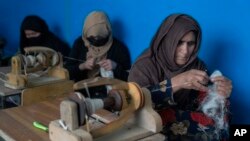The International Labor Organization said Tuesday that female employment levels in Afghanistan had fallen steeply since the Taliban took over the war-ravaged country.
The ILO, in a new report, found that Taliban curbs on women’s activities and their ability to work had contributed to the decline. It assessed that the recent edict barring women from working for national and international non-governmental organizations had exacerbated the situation.
“In the fourth quarter of 2022, female employment is estimated to have been 25 percent lower than in the second quarter of 2021, before the crisis. Male employment levels are down seven percent in the same period,” the report said.
The Taliban reclaimed power in August 2021 as the United States and NATO troops withdrew from Afghanistan after two decades of war.
The de facto leaders have since implemented a strict interpretation of Islamic law, or Sharia, barring most Afghan women from workplaces and banning female education beyond grade six in the impoverished country.
“Restrictions on girls and women have severe implications for their education and labor market prospects,” said Ramin Behzad, the senior ILO coordinator for Afghanistan.
The report noted that home-based self-employment had become the predominant form of women’s participation in the labor market, preventing the figure from falling further.
“Providing equal access for all young women and men to quality education and training as well as decent and productive employment opportunities remain a key challenge and priority for the future of the Afghan economy and society,” Behzad said.
The ILO report estimated that youth employment had decreased by 25% for Afghans between the ages of 15 and 24. It said that restrictions on young women have further contributed to the disproportionate and devastating impact of the crisis on youth.
Afghanistan continues to face a humanitarian crisis blamed on years of war, prolonged drought, harsh economic conditions and a challenging labor market.
The Taliban takeover worsened the crisis as foreign governments halted development funds for the largely aid-dependent country, froze more than $9 billion in Afghan central bank foreign assets and isolated the Afghan banking sector.
The international community has refused to recognize the Taliban as legitimate rulers of Afghanistan. It is calling for the hardline leadership to uphold human rights and cut ties with terrorist groups before it is willing to engage in diplomatic relations.





